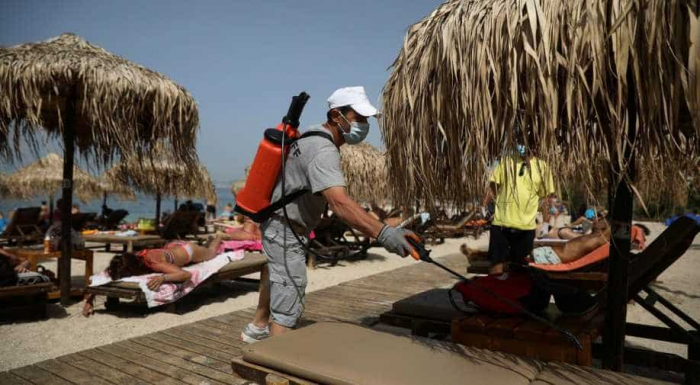There are some who believe that warmer temperatures may reduce risk of spreading or catching the coronavirus, considering seasonal flu typically spikes in the winter months. In addition, some reports during the early stages of the pandemic said that warmer climates may see fewer cases.
However, previous pandemics – such as the 1918 Spanish flu, which peaked during the summer months – could suggest otherwise.
So do warmer temperatures have a significant impact on transmission of the coronavirus?
Do warmer temperatures reduce risk of catching the coronavirus?
On the website for the World Health Organisation (WHO), it lists a series of mythsconcerning the coronavirus that it has deemed important for the public to be made aware of.
Among the list includes the notion that exposing yourself to the sun or to temperatures of higher than 25C prevents spread of Covid-19 – an idea that WHO has adamantly dismissed.
“You can catch Covid-19, no matter how sunny or hot the weather is,” the organisation states, adding that countries with hot climates “have reported cases of Covid-19”.
In a separate document, which has been tracking rumours circulating about the virus, WHO states that based on the current available evidence, “the Covid-19 virus can be transmitted in all areas, including areas with hot and humid weather”.
“Regardless of climate, adopt protective measures if you live in, or travel to an area reporting Covid-19,” the organisation advises, adding that people should frequently wash their hands to protect themselves from the virus.
Nonetheless, some studies have suggested that Covid-19 may exhibit seasonality in summer and winter.
Earlier this year, researchers at University College London conducted a study of the common coronaviruses, analysing historical data.
The researchers found that the highest rates of cases occurred in February, with fewer cases during summer.
“Our findings support the idea that in the UK we could see continued but lower levels of coronavirus transmission in the summer, but this may reverse in the winter if there is still a large susceptible population at that point,” said lead author Rob Aldridge.
“However, given this is a novel virus, we don’t know if this seasonal pattern will hold over the summer due to high levels of susceptibility in the population.”
A study conducted a decade ago by the Centre for Infectious Diseases at the University of Edinburgh concluded that three coronaviruses showed “marked winter seasonality”, causing infections predominantly between December and April, similarly to influenza.
Another study published in March 2020 by epidemiology company Ausvet Europe stated that preliminary evidence has shown that “higher temperatures are associated with lower incidence of Covid-19”, for cases reported up to 29 February across the globe.
However, it added that temperature “explained a relatively modest amount of the total variation of Covid-19 incidence”.
On 6 May 2020, a scientific study published in The Lancet by the London School of Hygiene and Tropical Medicine explored the “role of climate in Covid-19 mitigation strategies”.
The paper stated that while warmer weather “might slightly reduce transmission” of the coronavirus, “no evidence has suggested that warmer conditions will reduce the effectiveness of SARS-CoV-2 transmission to an extent that few additional interventions are needed to curb its spread”.
“At present, policy makers must focus on reducing physical contact within communities and any Covid-19 risk predictions based on climate information alone should be interpreted with caution,” it concluded.
Why does the flu peak in winter?
While it is understood that flu season reaches its peak in winter, there are several hypotheses why this may be.
One of the reasons is that when the temperature is cooler, people are more likely to take public transport and so have a greater chance of coming into close contact with other people.
Another is that lack of vitamin D from reduced exposure to sunlight can impact our immune systems.
In 2008, research conducted by the National Institute of Child Health and Human Development found that the influenza virus has a coating, which becomes a hardened shell in winter.
When the virus enters the respiratory tract, this coating melts, the researchers found.
However, in the summer, the coating melts before it enters the respiratory tract, which may indicate why it is less likely to spread.
Should we expect to see cases of Covid-19 decline during the heatwave?
In the warmer weather, it is likely that an increased number of people will be spending time outdoors while social distancing.
While this could mean that people may spend less time indoors in close proximity to other individuals, it may also result in members of the public becoming lax with social distancing measures as they head to the park and other people’s homes.
Either way, the WHO stresses that Covid-19 can still be spread in warmer temperatures, so social distancing guidelines and good hygiene should be stringently practised.
The Independent
More about: coronavirus
















































